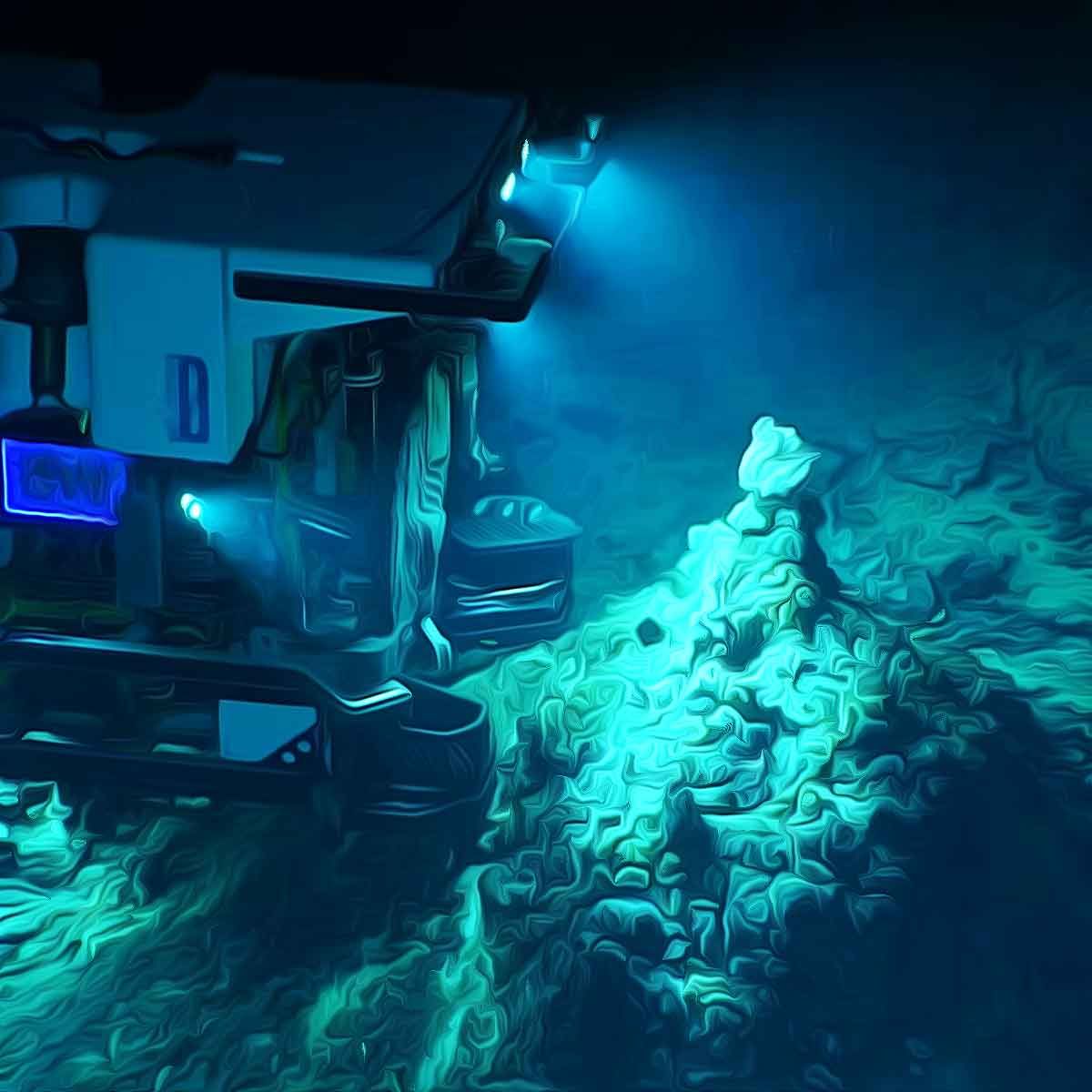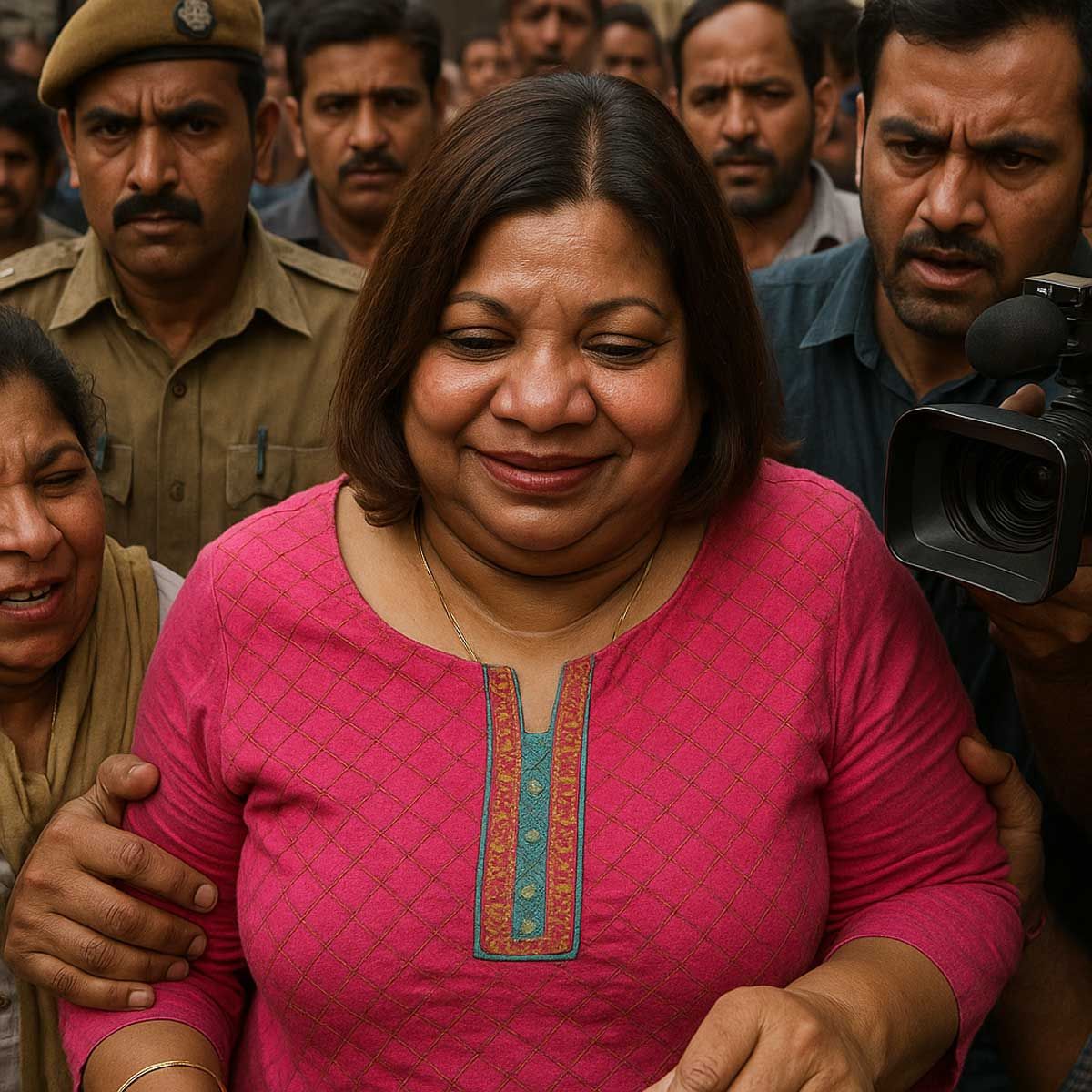More Coverage
Twitter Coverage
Satyaagrah
Written on
Satyaagrah
Written on
Satyaagrah
Written on
Satyaagrah
Written on
Satyaagrah
Written on
JOIN SATYAAGRAH SOCIAL MEDIA
"If you search ocean deep enough you can find rare exotic treasures": After Lithium deposits in Jammu & Kashmir, vast mineral deposits in the Indian Ocean can make Bharat self-sufficient in nickel & cobalt - top official of International Seabed Authority

Vast mineral deposits in the Indian Ocean can make India self-sufficient in nickel and cobalt, a top official of the International Seabed Authority (ISA) said on Tuesday. Nickel and cobalt are critical ingredients in the lithium-ion batteries used in most electric vehicles, which are zero-emission automobiles.
|
Praising the Indian government's efforts in this direction through its "Deep Ocean Mission", Michael W Lodge, ISA's Secretary-General, also exuded confidence that India can become a global leader in deep-sea mining.
He was speaking to reporters on the sidelines of the 'International Conference on Seabed Mining', held at the Gujarat National Law University in Gandhinagar.
"India was one of the very first pioneer investors in deep sea mining, starting from the 1980s. In recent years, there has been enormous progress. Under the Deep Ocean Mission, India's progress was phenomenal. India has the potential to become a global leader in deep sea mineral exploration and exploitation," said Lodge.
Headquartered in Kingston, Jamaica, ISA is an intergovernmental body of 167 member states and the European Union.
Lodge said he was "extremely encouraged" by the commitment at the political, scientific, and technical level and said India can compete with any other country in this avenue.
"We are looking at hard minerals, such as polymetallic nodules and sulphides. They contain vast quantities of critical minerals needed for the global energy transition, particularly copper, nickel, cobalt and manganese," he said when asked what minerals can be mined from the Indian Ocean seabed apart from crude oil and gas.
"India is not self-sufficient in nickel, and it can create a big problem for India unless you can develop a domestic supply. But, the seabed contains all the nickel to meet India's domestic demand, if India wants to become a leader in critical minerals globally, India has the potential to do that. Similarly, India does not have any secured source for cobalt. But, the seabed offers that source," he said.
ISA is mandated under the UN Convention on the Law of the Sea to organize, regulate and control all mineral-related activities in the international seabed area for the benefit of mankind as a whole, says the ISA website.
In August 2022, a Press Information Bureau (PIB) release stated that under the schemes "Ocean-Services, Modelling, Application, Resources and Technology (O-SMART)" and "Deep Ocean Mission (DOM)" of the Union environment ministry, resource inventories for energy, fisheries, and minerals have been taken up.
It was also said that the Government of India signed a 15-year contract with ISA for the exploration of polymetallic nodules, which contain nickel, cobalt, copper, and manganese, from the Central Indian Ocean Basin in 2002. Extensive surveys and other developmental activities have been carried out in 75,000-sqkm area retained by India in CIOB.
The Union green ministry has undertaken exploration and other developmental activities related to polymetallic sulfides in the Indian Ocean under a 15-year contract signed in 2016 with ISA, said a PIB release last August.
G20: Trade, Blue waters, and the importance of the Indian Ocean
Delhi: The Foreign Policy in the Indian context cannot be simply confined to New Delhi’s positioning on Pakistan and Kashmir or taking important calls on Indo-US and India-Russia ties. The Indian Ocean holds great strategic importance in more ways than one.
The Indian Ocean today sees about 60 percent of the world trade passing through its waters.
In Manila, Philippines, on Nov 12, 2017, on the sidelines of the ASEAN meet, in a major diplomatic initiative, giving a new impetus to the emergence of a new quadrilateral structure – India, the United States, Australia, and Japan had agreed that a free, open, prosperous and inclusive Indo-Pacific region would “serve the long-term interests of all countries” in the region and of the world at large.
Needless to say, even the German and European interests converge with that of India regarding the importance of the Indian Ocean. There are many other players. Hence, the ensuing G20 Summit to be hosted by New Delhi can be an excellent stage to highlight the significance of the Indian Ocean and the adjoining region.
There is also the Indian Ocean Rim Association (IORA). It is a dynamic Inter-Governmental organization aimed at strengthening regional cooperation and sustainable development within the Indian Ocean region through its 23 Member States and 10 Dialogue Partners.
Notably, IORA also became an observer to the UN General Assembly and the African Union in 2015.
From its inception with 14 member states, the membership has expanded to 23 countries: India, Australia, Bangladesh, Comoros, France, Indonesia, Iran, Kenya, Madagascar, Malaysia, Maldives, Mauritius, Mozambique, Oman, Seychelles, Singapore, Somalia, South Africa, Sri Lanka, Tanzania, Thailand, the United Arab Emirates, and Yemen.
IORA has ten dialogue partners: China, Egypt, Germany, Italy, Japan, Russia, Turkey, the Republic of Korea, the UK, and the US. It is based on the principles of Open Regionalism for strengthening Economic Cooperation, particularly in Trade Facilitation and Investment, promotion as well as Social Development of the region.
Sources in the Indian government said the countries have been trying to foster greater collaboration on maritime security and domain awareness and disaster response capabilities. From time to time, countries interested in the affairs of the Indian Ocean also pledged to fight the scourge of terrorism in all its forms and manifestations and stressed the need for enhanced cooperation on counter-terrorism.
Now at the level of the government headed by Narendra Modi, one would point out the SAGAR initiative. This has been a highly strategic move to guard India’s national interests. New Delhi enhancing its relations and bilateral ties with the Indian Ocean Region littoral states is a great step towards achieving maritime peace and cooperation.
PM Modi has made a clear stance on India’s priority in actively participating in the issues concerning the Indian Ocean Region. PM’s SAGAR Initiative – Security And Growth for All in the Region- is essentially
aimed at safeguarding the maritime interests of its mainland and islands.
The SAGAR initiative was first introduced during Modi’s visit to Mauritius in 2016. The move also highlights the importance of Coast Guard agencies of the littoral states to counter-piracy actions by non-state actors. Another crucial element of this initiative is to enhance collaboration in trade, tourism, and infrastructure. The climate change problems also get due attention.
Indian Ocean Naval Symposium and India-Sri Lanka-Maldives trilateral agreement are also important in this context.
India’s target to become a Net Security Provider in IOR officially started when India exported the first ‘Made in India warship to Mauritius. India has also sought to build Coastal Surveillance Networks in Seychelles,
Maldives, Mauritius, Bangladesh, and Sri Lanka. While India already has good defence and security relations with Maldives, Mauritius, and Seychelles, it wants to expand its reach to other countries in South-East Asia and Africa.
Historically the European conquest of South and South East Asia shows how strong can be the tentacles of sea power. This brings us to the importance of security in sea power and the Indian Ocean. Thus India will endeavor to lead and guide other allies and platforms, such as the G20, to emerge as a harbinger of international and regional maritime cooperation as well, and that too through a pragmatic approach.
There is also a need to rethink vis-a-vis ‘resource extraction’ in the Indian Ocean. The vast availability of minerals and other natural resources is an asset to economic development in the Indian Ocean Region.
However, the extractions have to be ‘mindful’ of the future. It ought to be understood that the IOR littoral states are rich in producing various raw materials, primarily oil, which is key to the development of major manufacturing industries.
As it is understood, along with India, even big players China and the United States give adequate importance to upholding smooth relations with ‘Island States’ to access logistics facilities on their territories. These island states include Sri Lanka and Maldives in South Asia, and also Mauritius, Comoros, Reunion, and Seychelles.
In 2015, Prime Minister Narendra Modi, along with NSA Ajit Doval (and incidentally then Foreign Secretary Dr. S Jaishankar), visited Seychelles. He was the first Indian leader to do so in over three decades. The Prime Minister had said that India “attaches paramount importance to strengthening relations with this region, which is vital for India’s security and progress”. His reference was also to Mauritius and Sri Lanka.
The Small Island Developing States in the Indian Ocean have already become important as logistics facilities for Asian and non-Asian navies to sail and sustain themselves far away from their home ports. Perhaps, India has, over the years, realized the importance of the Andaman & Nicobar Islands as a military platform for aero-naval surveillance over the Malacca Straits and South-East Asia.
In fact, under the Vajpayee government in 2001 itself, this island became India’s first tri-Services Command with the army, air force, and navy, besides coast guard elements, to ensure maritime and territorial security.
India has signed agreements to permit Japan access to its logistics facilities at the Andaman and Nicobar Islands. India has now ‘logistics facilities’ for the operational turnaround of Indian warships to refuel and get water in Singapore since 2017. Also, since 2018, India is the only other country, apart from USNS Mercy, a hospital ship, to enjoy logistics facilities at Nha Trang on the Cam Ranh Bay in Vietnam.
Conclusion
In the ultimate analysis, India’s national security concerns and great power ambitions manifest themselves in India’s engagement in the Indian Ocean region. Of course, the G20 will provide an excellent platform to ensure greater exploitation of its strategic ties with countries interested in maritime trade and security and also countries such as Mauritius and Seychelles. These hold the key to greater maritime strategic
influence in the region.
Being a maritime nation with considerable economic and military power, India has shown the ability to demonstrate its role as a significant security provider. New Delhi has, over the years, sought to develop a security presence and strengthen its position by capitalizing on its historical ties with the littoral nations. Now in a futuristic sense, both short and long terms efforts should be directed at making the Indian influence more visible in the strategic affairs of the region.
References:
 Support Us
Support Us
Satyagraha was born from the heart of our land, with an undying aim to unveil the true essence of Bharat. It seeks to illuminate the hidden tales of our valiant freedom fighters and the rich chronicles that haven't yet sung their complete melody in the mainstream.
While platforms like NDTV and 'The Wire' effortlessly garner funds under the banner of safeguarding democracy, we at Satyagraha walk a different path. Our strength and resonance come from you. In this journey to weave a stronger Bharat, every little contribution amplifies our voice. Let's come together, contribute as you can, and champion the true spirit of our nation.
 |  |  |
| ICICI Bank of Satyaagrah | Razorpay Bank of Satyaagrah | PayPal Bank of Satyaagrah - For International Payments |
If all above doesn't work, then try the LINK below:
Please share the article on other platforms
DISCLAIMER: The author is solely responsible for the views expressed in this article. The author carries the responsibility for citing and/or licensing of images utilized within the text. The website also frequently uses non-commercial images for representational purposes only in line with the article. We are not responsible for the authenticity of such images. If some images have a copyright issue, we request the person/entity to contact us at This email address is being protected from spambots. You need JavaScript enabled to view it. and we will take the necessary actions to resolve the issue.
Related Articles
- Professor Rajendra Bihari Lal, who has appeared in more than 400 such 'inspirational' videos, is an accused in a multi-crore bank fraud scam
- Not just wanting to use hospitals to convert Hindus, IMA Chief Johnrose Jayalal also harbours visceral hate for PM Modi
- Giving out a clear message to China, Northern Army Commander Lt Gen YK Joshi says ‘Operation Snow Leopard still on, troops on alert’ amid talks between India and China regarding disengagement in Ladakh are underway
- In a historic move, Maharashtra rejoices as Shivaji Maharaj's iconic weapon, the 'Wagh Nakh', making its triumphant return from the UK, relive the tale of this legendary weapon, embodying Shivaji's strategic genius and India's rich martial heritage
- "Global trust, local talent: India's invitation to the semiconductor world": PM Modi announces that India's moment has arrived in the semiconductor, Global leaders unite in praise as India gets ready to take center stage in the semiconductor industry
- Was Nehru gay? Did he have bisexual relations? Did he die because of STD? What foreign media said about Jawaharlal Nehru
- Social media influencers normalise ‘hate sex’ with ‘Sanghis’ because women are ‘hot’
- Tragedy or Drama: Mufti Mohammad Sayeed's daughter Rubaiya abduction led to free five most notorious terrorists
- Dharm / Sanskriti
- Righteousness vs Loyalty: Prince Rama obeys his father and leaves the Ayodhya kingdom
- Manyavar commercial featuring Alia Bhatt vilifies Hindu wedding ritual Kanyadaan: Why not object Western practice of ‘giving away the bride’ and Nikah (marriage contract)
- Tipu Sultan remembered as killer of Brahmins and demolisher of temples in many villages of Tamil Nadu: a freedom fighter or Islamic bigot?
- Yogi blistering attack and war of words on Samajwadi Party includes ‘atankvadiyon ko thokne ke liye ATS center’ to ‘SP targeting guns at Ram devotees’: Political atmosphere in UP is all charged up ahead of the upcoming elections
- "All trees are desire-fulfilling. All water is the Ganga. All land is Varanasi": United Nations recognised Indian Govt's efforts to rejuvenate sacred Ganges River as one of the 10 pioneering efforts to revive natural world, rejuvenated 30000 ha of forests
- NCPCR Asks Delhi Police To File FIR Against Twitter; Seeks Ban For Kids Until Deemed Safe




























